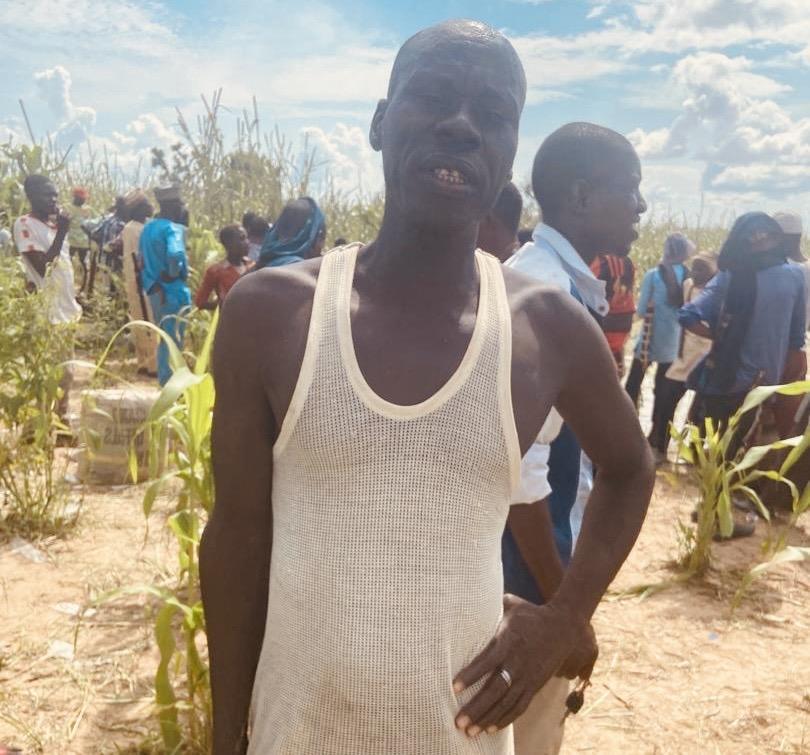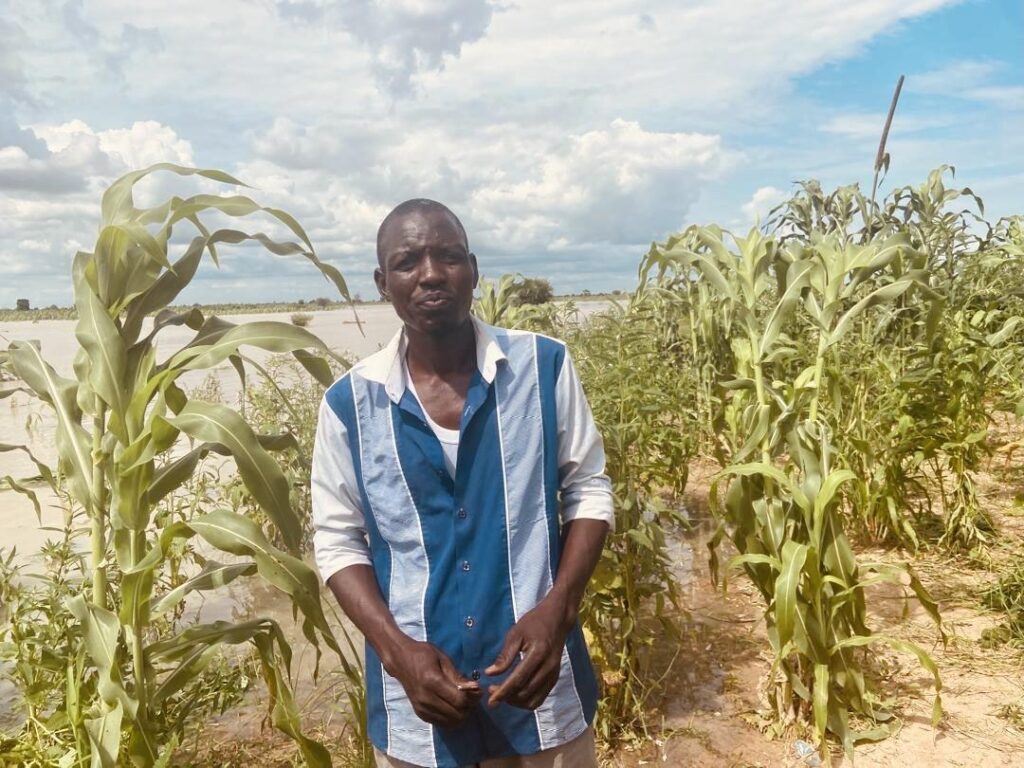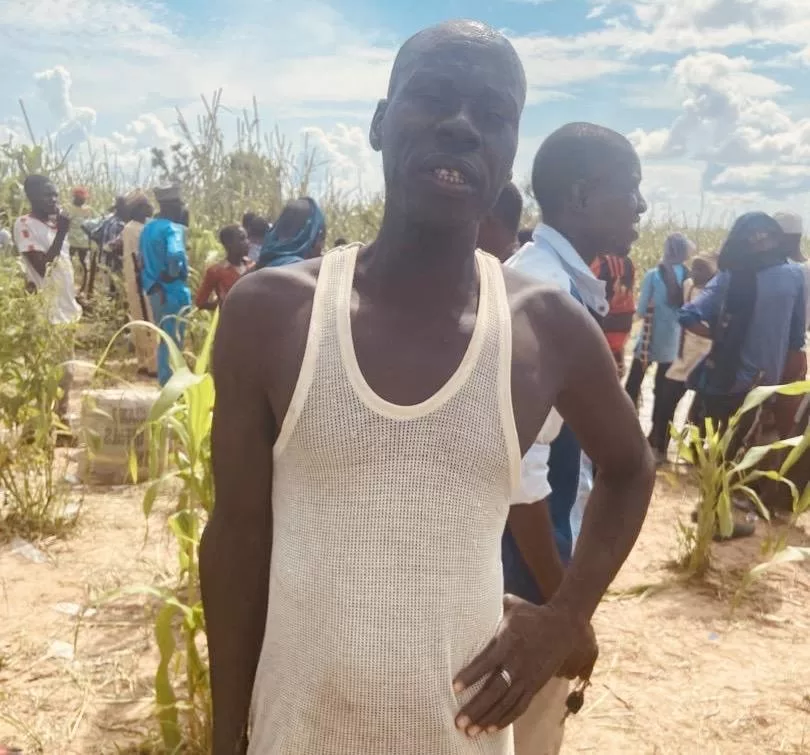Jumbam Musa, a 40-year-old farmer in the Jumbam community, Yobe State, northeastern Nigeria, cultivated his farmland with care, and the income from his agricultural business was enough to take care of his immediate family.
But the devastating floods experienced in the community in the last five years have left his farm in ruins. However, this year’s flooding has consumed not just crops but their homes as well, displacing him and his relatives.
“This crisis has been affecting us for the past five years,” Musa told HumAngle as his voice cracked with emotion. “But the flood this year has been the hardest for us to bear. The water which fails to stop continues to destroy everything we’ve worked for.”
With the country’s economic situation pushing families like Musa’s to the brink, he put everything he had into his fields, driven by the hope that this year’s harvest would ease the burden of hunger and poverty. However, this did not turn out well, as they are currently faced with uncertainties and desperately need food and shelter.

“Our major problem now is food because the situation has put us into a critical condition,” he added. “This situation has really disturbed me mentally because I no longer get appropriate sleep. We stay hungry all day; how can anyone sleep in such a condition?”
Severe flooding in North East
The northeastern region of Nigeria has, in the last few months, experienced severe flooding, destroying multiple communities, with significant loss of lives and properties reported. According to ReliefWeb, a humanitarian information service provided by the United Nations Office for the Coordination of Humanitarian Affairs, the torrential downpours in the region have been more severe than in the last two years.
In Yobe, the flooding has wreaked havoc on different parts of the state as the roads linking major towns have been submerged in water, causing displacement of residents in Jumbam, Baiyamari, Garin Alkali, and Gashua.
While Mohammed Goje, the Executive Secretary of Yobe State Emergency Management Agency (SEMA), admitted that the recent flooding brought multiple challenges, he claimed that the government had taken proactive measures based on Nigerian Meteorological Agency (NIMET) directives.
“This scale of flooding hasn’t been seen in many years, but we remain hopeful that it will subside soon,” he said.
Meanwhile, Goje’s claim that the state has initiated its first phase of flood response by delivering essential food items and dignity kits to vulnerable individuals affected by the flooding was refuted by Jumbam residents, who said they are yet to get any relief items despite the hardship confronting them.
“We need assistance, especially food because only God knows what will happen in the coming days,” Musa pleaded.
The road to nowhere
Having worked in Yobe as a commercial driver for years, Dauda Yusuf knows all the roads in the state like the back of his hand. However, the route he once navigated with ease has become a treacherous journey as a result of floods.
Before the bridge along Damaturu-Dapchi road was cut into two by heavy rainfall, Yusuf usually transported passengers twice daily. But the good old days now seem like a distant memory as the fear of getting stranded along the flood-damaged roads discourages travellers.
“It’s now very hard for me to get passengers, let alone drive them to where they need to go,” Yusuf told HumAngle amid frustration. “This challenge has resulted in me not earning the usual money to support myself and my family.”

Aside from Yusuf, the flood-damaged roads have also cast a shadow over the livelihoods of other commuters.
“This bridge destroyed by the flood has affected not just me but all my fellow drivers here and even the traders. We’re all afraid and keep thinking we might get stuck along the way if we plan any travel,” he explained.
Yusuf, however, told HumAngle that they had accepted the new reality but sometimes risked the journey to make a living.
“We haven’t gotten any help so far, but we hope to see it soon from the federal, state, and humanitarian agencies,” he said.
Authorities
Speaking with HumAngle, Abubakar Abdullahi, a lawmaker representing Jumbam at Tarmuwa Local Government Area of Yobe, confirmed that the recent flooding destroyed around 100 houses and a significant number of farmlands, as well as roads and waterways.
Asked about efforts by authorities to alleviate the suffering of affected people, Abdullahi simply said the state’s government is facilitating long-term solutions.
“We’ve been assured that the state government has issued directives for the immediate construction of an emergency bridge, which will allow us to resume our daily activities. The state government has also stated that a standard bridge will be built once the rainy season ends,” Abdullahi said.
Disturbed by the challenges of farmers, he said, “People worked hard to farm successfully this season, but the flood has devastated most of the farmlands, as you can see. We are deeply concerned that this could lead to another hunger crisis.”
“We are still appealing to the government and other relevant authorities to provide emergency assistance to our people. Most of those affected by the flood relied on daily work to feed their families, and now there’s no way for them to even get out to work. People are really suffering, and we are calling for urgent assistance,” Abdullahi concluded.
Impact of flooding
In reaction to recent flooding in Nigeria, Abubakar Kawu Monguno, a professor of Geography at the University of Maiduguri, said the rainy season brings varying degrees of change.
“Based on available research, climate change appears to be the driving factor behind these fluctuations. This year, states like Borno, Yobe, Bauchi, and Jigawa have been significantly affected by floods. In contrast, areas in Nigeria’s Middle Belt, such as Kwara, Niger, Jos, Benue, and Taraba, are now grappling with drought. Historically, these regions have experienced substantial rainfall, but this year, the situation has changed drastically. When the impacts of climate change are felt, the unexpected becomes reality,” he said.
Professor Monguno also noted that neighbouring Niger Republic is currently facing intense rainfall, resulting in severe flooding in some regions.
“When we consider the causes, it’s evident that human activities contribute significantly. For example, the emissions from our vehicles, carbon dioxide from industrial processes, methane gas release, and chlorofluorocarbons from appliances like refrigerators and air conditioners all contribute to climate change, leading to extreme weather conditions, floods, and droughts,” the expert said.
In a bid to address the menace, Professor Monguno called for tree planting to absorb carbon dioxide, which can help mitigate extreme weather conditions.
“Governments, both at the federal and state levels, should implement policies to prevent construction near rivers. Also, the importance of dredging cannot be overstated; it helps manage the risks associated with heavy rainfall,” he emphasised.
He also advised farmers whose maize, wheat, and millet crops were destroyed to consider planting beans as a replacement.
This report was produced under the 2024 HumAngle Accountability Fellowship with support from the MacArthur Foundation.
